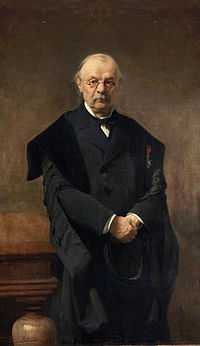Eugène Catalan
| Eugène Charles Catalan | |
|---|---|
 |
|
| Born |
30 May 1814 Bruges |
| Died | 14 February 1894 (aged 79) Liège |
| Nationality | French |
| Fields | Mathematics |
| Alma mater | Ecole Polytechnique |
| Doctoral advisor | Joseph Liouville |
| Doctoral students |
François Deruyts Charles Hermite Constantin Le Paige |
| Known for | Catalan's conjecture, Catalan numbers |
Eugène Charles Catalan (30 May 1814 – 14 February 1894) was a French and Belgian mathematician who worked on continued fractions, descriptive geometry, number theory and combinatorics. His notable contributions included discovering a periodic minimal surface in the space ; stating the famous Catalan's conjecture, which was eventually proved in 2002; and, introducing the Catalan numbers to solve a combinatorial problem.
Catalan was born in Bruges (now in Belgium, then under Dutch rule even though the Kingdom of the Netherlands had not yet been formally instituted), the only child of a French jeweller by the name of Joseph Catalan, in 1814. In 1825, he traveled to Paris and learned mathematics at École Polytechnique, where he met Joseph Liouville (1833). In December 1834 he was expelled along with most of the students in his year for political reasons; he resumed his studies in January 1835, graduated that summer, and went on to teach at Châlons-sur-Marne. Catalan came back to the École Polytechnique, and, with the help of Liouville, obtained his degree in mathematics in 1841. He went on to Charlemagne College to teach descriptive geometry. Though he was politically active and strongly left-wing, leading him to participate in the 1848 Revolution, he had an animated career and also sat in the France's Chamber of Deputies. Later, in 1849, Catalan was visited at his home by the French Police, searching for illicit teaching material; however, none was found.
...
Wikipedia

